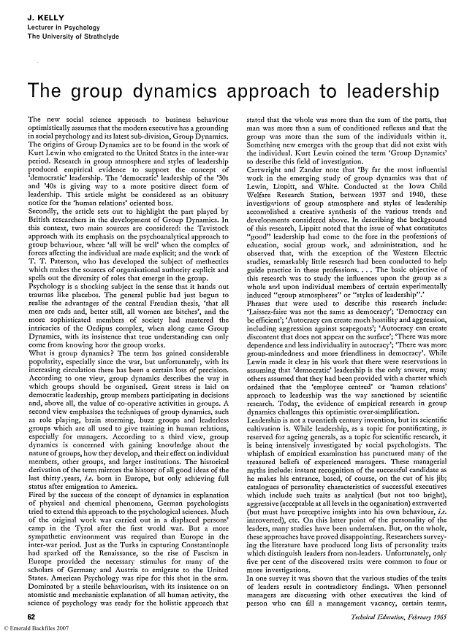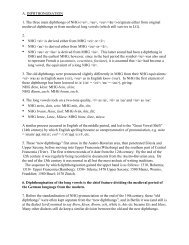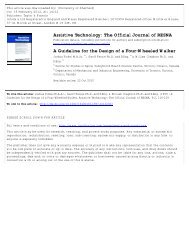The Group Dynamics Approach to Leadership - Emerald
The Group Dynamics Approach to Leadership - Emerald
The Group Dynamics Approach to Leadership - Emerald
You also want an ePaper? Increase the reach of your titles
YUMPU automatically turns print PDFs into web optimized ePapers that Google loves.
J. KELLY<br />
Lecturer in Psychology<br />
<strong>The</strong> University of Strathclyde<br />
<strong>The</strong> group dynamics approach <strong>to</strong> leadership<br />
<strong>The</strong> new social science approach <strong>to</strong> business behaviour<br />
optimistically assumes that the modern executive has a grounding<br />
in social psychology and its latest sub-division, <strong>Group</strong> <strong>Dynamics</strong>.<br />
<strong>The</strong> origins of <strong>Group</strong> <strong>Dynamics</strong> are <strong>to</strong> be found in the work of<br />
Kurt Lewin who emigrated <strong>to</strong> the United States in the inter-war<br />
period. Research in group atmosphere and styles of leadership<br />
produced empirical evidence <strong>to</strong> support the concept of<br />
'democratic' leadership. <strong>The</strong> 'democratic' leadership of the '30s<br />
and '40s is giving way <strong>to</strong> a more positive direct form of<br />
leadership. This article might be considered as an obituary<br />
notice for the 'human relations' oriented boss.<br />
Secondly, the article sets out <strong>to</strong> highlight the part played by<br />
British researchers in the development of <strong>Group</strong> <strong>Dynamics</strong>. In<br />
this context, two main sources are considered: the Tavis<strong>to</strong>ck<br />
approach with its emphasis on the psychoanalytical approach <strong>to</strong><br />
group behaviour, where 'all will be well' when the complex of<br />
forces affecting the individual are made explicit; and the work of<br />
T. T. Paterson, who has developed the subject of methectics<br />
which makes the sources of organisational authority explicit and<br />
spells out the diversity of roles that emerge in the group.<br />
Psychology is a shocking subject in the sense that it hands out<br />
traumas like placebos. <strong>The</strong> general public had just begun <strong>to</strong><br />
realise the advantages of the central Freudian thesis, 'that all<br />
men are cads and, better still, all women are bitches', and the<br />
more sophisticated members of society had mastered the<br />
intricacies of the Oedipus complex, when along came <strong>Group</strong><br />
<strong>Dynamics</strong>, with its insistence that true understanding can only<br />
come from knowing how the group works.<br />
What is group dynamics? <strong>The</strong> term has gained considerable<br />
popularity, especially since the war, but unfortunately, with its<br />
increasing circulation there has been a certain loss of precision.<br />
According <strong>to</strong> one view, group dynamics describes the way in<br />
which groups should be organised. Great stress is laid on<br />
democratic leadership, group members participating in decisions<br />
and, above all, the value of co-operative activities in groups. A<br />
second view emphasises the techniques of group dynamics, such<br />
as role playing, brain s<strong>to</strong>rming, buzz groups and leaderless<br />
groups which are all used <strong>to</strong> give training in human relations,<br />
especially for managers. According <strong>to</strong> a third view, group<br />
dynamics is concerned with gaining knowledge about the<br />
nature of groups, how they develop, and their effect on individual<br />
members, other groups, and larger institutions. <strong>The</strong> his<strong>to</strong>rical<br />
derivation of the term mirrors the his<strong>to</strong>ry of all good ideas of the<br />
last thirty, years, i.e. born in Europe, but only achieving full<br />
status after emigration <strong>to</strong> America.<br />
Fired by the success of the concept of dynamics in explanation<br />
of physical and chemical phenomena, German psychologists<br />
tried <strong>to</strong> extend this approach <strong>to</strong> the psychological sciences. Much<br />
of the original work was carried out in a displaced persons'<br />
camp in the Tyrol after the first world war. But a more<br />
sympathetic environment was required than Europe in the<br />
inter-war period. Just as the Turks in capturing Constantinople<br />
had sparked off the Renaissance, so the rise of Fascism in<br />
Europe provided the necessary stimulus for many of the<br />
scholars of Germany and Austria <strong>to</strong> emigrate <strong>to</strong> the United<br />
States. American Psychology was ripe for this shot in the arm.<br />
Dominated by a sterile behaviourism, with its insistence on an<br />
a<strong>to</strong>mistic and mechanistic explanation of all human activity, the<br />
science of psychology was ready for the holistic approach that<br />
stated that the whole was more than the sum of the parts, that<br />
man was more than a sum of conditioned reflexes and that the<br />
group was more than the sum of the individuals within it.<br />
Something new emerges with the group that did not exist with<br />
the individual. Kurt Lewin coined the term '<strong>Group</strong> <strong>Dynamics</strong>'<br />
<strong>to</strong> describe this field of investigation.<br />
Cartwright and Zander note that 'By far the most influential<br />
work in the emerging study of group dynamics was that of<br />
Lewin, Lippitt, and White. Conducted at the Iowa Child<br />
Welfare Research Station, between 1937 and 1940, these<br />
investigations of group atmosphere and styles of leadership<br />
accomplished a creative synthesis of the various trends and<br />
developments considered above. In describing the background<br />
of this research, Lippitt noted that the issue of what constitutes<br />
"good" leadership had come <strong>to</strong> the fore in the professions of<br />
education, social group work, and administration, and he<br />
observed that, with the exception of the Western Electric<br />
studies, remarkably little research had been conducted <strong>to</strong> help<br />
guide practice in these professions. . . . <strong>The</strong> basic objective of<br />
this research was <strong>to</strong> study the influences upon the group as a<br />
whole and upon individual members of certain experimentally<br />
induced "group atmospheres" or "styles of leadership".'<br />
Phrases that were used <strong>to</strong> describe this research include:<br />
'Laissez-faire was not the same as democracy'; 'Democracy can<br />
be efficient'; 'Au<strong>to</strong>cracy can create much hostility and aggression,<br />
including aggression against scapegoats'; 'Au<strong>to</strong>cracy can create<br />
discontent that does not appear on the surface'; '<strong>The</strong>re was more<br />
dependence and less individuality in au<strong>to</strong>cracy'; '<strong>The</strong>re was more<br />
group-mindedness and more friendliness in democracy'. While<br />
Lewin made it clear in his work that there were reservations in<br />
assuming that 'democratic' leadership is the only answer, many<br />
others assumed that they had been provided with a charter which<br />
ordained that the 'employee centred' or 'human relations'<br />
approach <strong>to</strong> leadership was the way sanctioned by scientific<br />
research. Today, the evidence of empirical research in group<br />
dynamics challenges this optimistic over-simplification.<br />
<strong>Leadership</strong> is not a twentieth century invention, but its scientific<br />
cultivation is. While leadership, as a <strong>to</strong>pic for pontificating, is<br />
reserved for ageing generals, as a <strong>to</strong>pic for scientific research, it<br />
is being intensively investigated by social psychologists. <strong>The</strong><br />
whiplash of empirical examination has punctured many of the<br />
treasured beliefs of experienced managers. <strong>The</strong>se managerial<br />
myths include: instant recognition of the successful candidate as<br />
he makes his entrance, based, of course, on the cut of his jib;<br />
catalogues of personality characteristics of successful executives<br />
which include such traits as analytical (but not <strong>to</strong>o bright),<br />
aggressive (acceptable at all levels in the organisation) extraverted<br />
(but must have perceptive insights in<strong>to</strong> his own behaviour, i.e.<br />
introverted), etc. On this latter point of the personality of the<br />
leaders, many studies have been undertaken. But, on the whole,<br />
these approaches have proved disappointing. Researchers surveying<br />
the literature have produced long lists of personality traits<br />
which distinguish leaders from non-leaders. Unfortunately, only<br />
five per cent of the discovered traits were common <strong>to</strong> four or<br />
more investigations.<br />
In one survey it was shown that the various studies of the traits<br />
of leaders result in contradic<strong>to</strong>ry findings. When personnel<br />
managers are discussing with other executives the kind of<br />
person who can fill a management vacancy, certain terms,<br />
62 Technical Education, February 1965<br />
© <strong>Emerald</strong> Backfiles 2007
irrespective of function or level, keep cropping up with<br />
mono<strong>to</strong>nous regularity, e.g. analytical, decisive, determined,<br />
acceptable, etc, thus indicating that most managers still accept<br />
the personality-trait approach.<br />
Why has the personality-trait approach failed ? One explanation<br />
that has been suggested is that neither personality nor personality<br />
traits are clearly unders<strong>to</strong>od or are capable of accurate measurement.<br />
Again, it may be important <strong>to</strong> ascertain how the executive<br />
position was achieved.<br />
Executive appointments may be made on the basis of managerial<br />
potential, but they may also be made on the basis of technical<br />
competence, seniority, kinship, lack of managerial potential,<br />
membership of a particular educational, military or religious<br />
organisation or any other form of nepotism. So a different<br />
approach is required.<br />
<strong>The</strong> leadership syndrome<br />
A good starting point for understanding leadership is provided<br />
by accepting that leadership follows, a particular fashion, which<br />
changes with variations in the political and economic climate.<br />
Or, if you like, each society has a pattern of leadership symp<strong>to</strong>ms.<br />
Three such leadership syndromes have been identified. <strong>The</strong><br />
first, the machine theory of organisation, is usually associated<br />
with the name of Frederick Winslow Taylor. Taylorism treats<br />
the worker primarily as an economic animal, is obsessed with the<br />
scientific measure of a fair day's work and pays little or no heed<br />
<strong>to</strong> the human aspect of work. This approach views the human<br />
agent exclusively as an instrument. <strong>The</strong> reaction <strong>to</strong> the excesses<br />
of Taylorism produced the second approach, known as the<br />
Human Relations School, which is usually linked with El<strong>to</strong>n<br />
Mayo and his Hawthorne Experiment. He argued that an<br />
industrial organisation should be viewed as a social system<br />
which has two main functions, 'that of producing a product and<br />
that of creating and disttibuting satisfaction among the individual<br />
members of the organisation'. <strong>The</strong> former - described as the<br />
economic function — was, in his opinion adequately developed<br />
in industry; the latter, on the other hand, which is concerned<br />
with developing good human relations in the firm, he regarded<br />
as inadequately developed. In turn, the Human Relations<br />
School is being superseded by the Task <strong>Approach</strong>. In the Task<br />
<strong>Approach</strong>, which is associated with the name of Wilfred Brown,<br />
the chairman of the Glacier Metal Company, 'the work <strong>to</strong> be<br />
done and the resources available, both technical and human,<br />
determine the method of work <strong>to</strong> be employed'.<br />
<strong>The</strong> first body-blow <strong>to</strong> the Society devoted <strong>to</strong> Human Relations<br />
was delivered in Korea. <strong>The</strong> crunch came when Human<br />
Relations was confronted by Task Management. In the prison<br />
camps, the Americans came out worst, the Turks best. Some<br />
said it was because the Turks shaved every day. Anyone who<br />
underestimates the strength of the film, of the democratic belief<br />
in the American mind, reinforced by the propaganda power of<br />
Hollywood should consider the following situations. <strong>The</strong>re is a<br />
curious parallel between the movie Warden of the penitentiary<br />
going out <strong>to</strong> talk <strong>to</strong> the rioting prisoners and the American<br />
General going in, unescorted <strong>to</strong> talk <strong>to</strong> the North Korean<br />
prisoners. But the analogy breaks down when the North Korean<br />
prisoners kidnap the American General. <strong>The</strong> Agonising<br />
Reappraisal had started. <strong>The</strong> fifty-mile hikers were just around<br />
the corner. But worse was <strong>to</strong> come.<br />
If Korea was bad, the Sputniks were infinitely worse. So insecure<br />
were the Americans with the Russians' successes in satellite<br />
launchings, that the acts of conspicuous consumption became<br />
less conspicuous - compare the success of the compacts during<br />
this era of Russian dominance. It is alleged that the big cars got<br />
smaller and the chrome got less. Certainly, the American<br />
upper-middle brow public was fed a dreary semi-scientific<br />
diet of literary exposes, in which the organisation man, the<br />
status seeker, the hidden persuaders were dissected. <strong>The</strong> scene<br />
had been set for the new hero - the task specialist.<br />
Finally, while this debate on leadership has been raging in<br />
American management literature, there has been scant evidence<br />
published in British journals showing an awareness of this<br />
organisational metamorphosis. Research by the writer using a<br />
technique of activity sampling <strong>to</strong> study the behaviour of<br />
industrial executives has confirmed Fiedler's portrait of the<br />
efficient executive.<br />
In spite of this lack of research in Britain in executive leadership,<br />
our society seems <strong>to</strong> have developed the social paraphernalia<br />
that facilitates the emergence of the task specialist. Consider the<br />
function of television which, it is argued, does not initiate trends,<br />
but confirms, and makes explicit, the extant forces. In the<br />
language of the Wasteland, Barlow is the task specialist out <strong>to</strong><br />
get a conviction at any price and Dixon is the Human Relations<br />
Specialist. Understandable, while the Police prefer Dixon, the<br />
public prefer Barlow. 'Task speak', the language of the new<br />
leadership, uses phrases such as, 'that's how the cookie crumbles'<br />
<strong>to</strong> describe not a person getting his just rewards, but rather <strong>to</strong><br />
describe the inevitable consequences of a particular depersonalised<br />
strategy. Or again, much of 'Task speak' is concerned with<br />
developing the language of Meri<strong>to</strong>cracy as derived from snakes<br />
and ladders. Phrases such as 'You start in square one', 'Getting<br />
a Ph.D. or a pub will get you up a ladder <strong>to</strong> square 13'. While<br />
the less sophisticated have a snakes and ladders model, the more<br />
sophisticated use the theory of games language (only), such as<br />
minimax, optimal strategies, zero sum game, and so on. Thus,<br />
through some curious social alchemy, society has read the<br />
obituary notices concerning the demise of democratic leadership.<br />
In preparation for his resurrection as a task specialist, society is<br />
preparing the necessary facilities, including a language, an<br />
appropriate model and suitable myths. Organisational research<br />
will chronicle the event objectively. <strong>The</strong> O.K. guy will get in<br />
on the ground floor, i.e. get on the board.<br />
<strong>The</strong> Tavis<strong>to</strong>ck approach<br />
<strong>The</strong> Tavis<strong>to</strong>ck Institute of Human Relations has provided the<br />
necessary theoretical constructs <strong>to</strong> enable the Glacier Metal<br />
Company <strong>to</strong> establish a theoretical basis for its management<br />
operations. <strong>The</strong>refore, it is particularly important <strong>to</strong> examine the<br />
contributions of this Institute <strong>to</strong> the work of social scientists in<br />
industry. <strong>The</strong> Tavis<strong>to</strong>ck Institute of Human Relations developed<br />
from the Tavis<strong>to</strong>ck Clinic, which from its earliest days has<br />
always had an interest in the psychoanalytical approach <strong>to</strong><br />
psychotherapy. As well as drawing its concepts from the field of<br />
psychoanalysis, many of the conceptual models have developed<br />
from the holistic approach <strong>to</strong> human problems - Gestalt<br />
psychology, Kurt Lewin's field theory, the functional anthropology<br />
of Malinowski, and the open system theory of von<br />
Bertalanffy. Inherent in this approach is the acceptance of the<br />
complexity of interacting forces at work in any situation. This<br />
complex of forces may involve personal, social and his<strong>to</strong>rical<br />
fac<strong>to</strong>rs. Implicit in this view is a reluctance <strong>to</strong> accept that chance<br />
can enter significantly as an explanation as <strong>to</strong> why an organisation<br />
developed in a particular way. This demands an approach that is<br />
dynamic rather than static.<br />
Again, even a cursory examination of the professions from which<br />
the staff of the Tavis<strong>to</strong>ck Institute of Human Relations are<br />
recruited, shows that they accept that problems rarely present<br />
themselves <strong>to</strong> investiga<strong>to</strong>rs neatly parcelled according <strong>to</strong><br />
academic function. Thus, in the Institute, you will find<br />
psychiatrists, psychologists, sociologists, statistitians and<br />
economists working in teams exploiting a multi-disciplinary<br />
approach in tackling a particular problem.<br />
Lewin's Field <strong>The</strong>ory<br />
Research workers of the Tavis<strong>to</strong>ck Institute readily acknowledge<br />
their debt of gratitude <strong>to</strong> Kurt Lewin. Lewin's most important<br />
work was done in the '30s after he had left Germany for the<br />
United States. Influenced by his mathematical training and his<br />
association with the Gestalt psychologists, he tried <strong>to</strong> develop<br />
his ideas about group dynamics in terms of vec<strong>to</strong>rs. He<br />
introduced the concept of life space. Life space refers <strong>to</strong> the<br />
Technical Education, February 1965 63<br />
© <strong>Emerald</strong> Backfiles 2007
whole system of the group and its environment; this includes the<br />
real aspects of the individuals' personalities, the physical<br />
environment, the individuals' concepts of one another, and the<br />
unreal elements, including their hopes, fears, ambitions, etc.<br />
Individual group members have goals which they desire <strong>to</strong><br />
achieve. By moving <strong>to</strong>wards these goals, they may gain release<br />
from tension. A group is viewed as a field of forces which is in<br />
a state of equilibrium.<br />
Bion's contribution<br />
Based on his experience of the War Office Selection Board and<br />
his experience with group therapy at the Tavis<strong>to</strong>ck Clinic, Bion<br />
developed a psycho-dynamic approach which has proved<br />
valuable not only in the clinical setting. Elliott Jaques has<br />
applied Bion's technique of 'working through a problem' <strong>to</strong><br />
gain insights in<strong>to</strong> the attitudes and beliefs of the participants in<br />
industrial organisations.<br />
According <strong>to</strong> Bion, when a group is brought <strong>to</strong>gether, it goes<br />
through a period of confusion before it settles down <strong>to</strong> the<br />
actual task. How successful it is in solving the problem depends<br />
on the group's sophistication. If the group is sophisticated and<br />
mature, it will deal with the realities of the situation and 'work<br />
through' <strong>to</strong> a solution. On the other hand, the less sophisticated<br />
groups are likely <strong>to</strong> respond emotionally <strong>to</strong> stress. <strong>The</strong>y may<br />
respond - by fight or flight reaction, by dependency, or by<br />
pairing. Bion's techniques were extensively used in the early<br />
stages of the Glacier experiment.<br />
Socio-technical system<br />
<strong>The</strong>re is a growing recognition that simple statements of the<br />
enterprise's objectives are no longer possible. <strong>The</strong> proposition<br />
that a firm exists simply <strong>to</strong> make a profit is no longer generally<br />
accepted. <strong>The</strong>re is a realisation that the enterprise has a number<br />
of tasks that include social and personal objectives, even if these<br />
only exist as limitations and constraints. <strong>The</strong> term 'mission' has<br />
been suggested as a single name for this complex of tasks. To<br />
develop this argument further, the Tavis<strong>to</strong>ck workers have<br />
developed the concept of the socio-technical system. Trist and<br />
Bamforth as a result of their study of the introduction of the<br />
mechanised long-wall system of mining did the early work in the<br />
development of the socio-technical theory. <strong>The</strong> socio-technical<br />
system is concerned with the interaction between the technical<br />
aspects and social aspects of the problem. Rice, in 'Productivity<br />
and Social Organisation', continues more generally: '<strong>The</strong><br />
concept of a production system as a socio-technical system<br />
designates a general field of study concerned with the interrelations<br />
of the technical and socio-psychological organisation of<br />
industrial production systems. . . . <strong>The</strong> concept of a sociotechnical<br />
system arose from the consideration that any production<br />
system requires both a technological organisation - equipment<br />
and process layout - and a work organisation relating <strong>to</strong> each<br />
other those who carry out the necessary tasks. <strong>The</strong> technological<br />
demands place limits on the type of work organisation possible,<br />
but a work organisation has social and psychological properties<br />
of its own that are independent of technology. ... A sociotechnical<br />
system must also satisfy the financial conditions of the<br />
industry of which it is a part. It must have economic dimensions,<br />
all of which are interdependent, but all of which have independent<br />
values of their own.'<br />
It has been further argued that a more comprehensive picture of<br />
an enterprise will be gained by viewing it as an open sociotechnical<br />
system. This assumes that an organisation both<br />
operates on the environment and is influenced by the environment.<br />
Open system theory, which is based on the work of the<br />
biologist von Bertalanffy, has been developed by Trist et al.<br />
<strong>The</strong> system of structural authority<br />
T. T. Paterson has analysed the sources of authority and has<br />
developed the subject of Methectics, which he defines as the<br />
study of participation in group life in terms of bes<strong>to</strong>wed and<br />
adopted roles. In this scheme, five forms of authority are<br />
recognised depending upon the purpose of the group and the<br />
organisation of its functions. <strong>The</strong>se five forms are structural,<br />
sapiential, moral, charismatic, and personal. Structural authority<br />
has a right springing from legal or other contract which is<br />
'vested in an office' in the organisation and therefore in the<br />
manager holding that post. Structural authority enables the<br />
manager <strong>to</strong> organise and control the work of others and requires<br />
obedience from other members of the group. In some circumstances,<br />
structural authority may be thought of as identical with<br />
line authority. Sapiential authority is the entitlement or right <strong>to</strong><br />
be heard by virtue of knowledge or expertise. 'It is wrong <strong>to</strong><br />
assume that when an individual is vested with structural<br />
authority that he is necessarily vested with sapiential authority'.<br />
<strong>The</strong> personnel manager has sapiential authority in so far as he<br />
had the necessary knowledge of personnel management, which<br />
he can use <strong>to</strong> improve the efficiency of the organisation.<br />
'Moral authority is the entitlement <strong>to</strong> control and direct by<br />
reason of "rightness" or "goodness" in action according <strong>to</strong> the<br />
contractual system (ethos) of the enterprise'. Managers often<br />
seek moral authority by emphasising the fairness of the proposals<br />
which they are advancing. <strong>The</strong> 'fair' manager will always<br />
attempt <strong>to</strong> back up his structural authority with moral authority.<br />
Charismatic authority is the right <strong>to</strong> lead when the source of<br />
reference is supernatural. Many managers exploit this charismatic<br />
authority when they assume the role of the father figure and develop<br />
an aura of omnipotence and omniscience. Personal authority<br />
is the right <strong>to</strong> command or lead by virtue of the fittingness of<br />
personality with the purpose of the enterprise. As a general rule,<br />
personal authority should not and cannot replace structural<br />
authority, though in some circumstances it may do so.<br />
In the informal group, he identified the following roles: the<br />
exemplar, who sets the group norms; the exdominus who is the<br />
group's external representative, the indominus who controls<br />
internal relationships, the eccentric, who represents a different<br />
point of view but can be the scapegoat or clown, the mimetic<br />
who follows the other roles and the isolate who is not a member<br />
of the 'group proper'.<br />
Weiss has observed that the leader should not assign work <strong>to</strong><br />
anyone who lacks the structural authority <strong>to</strong> perform his tasks,<br />
and he quotes the illustration where an accounting task was<br />
assigned <strong>to</strong> an engineering executive, which may have the effect<br />
of rupturing relationships between the chief engineer and the<br />
chief accountant. In this example the engineer would also be<br />
lacking sapiential authority.<br />
Limitations and criticisms<br />
<strong>The</strong> critics of <strong>Group</strong> <strong>Dynamics</strong> have concentrated on three<br />
aspects. It has been held that human behaviour is not subject <strong>to</strong><br />
laws like the physical sciences, that social phenomena cannot be<br />
quantified and that experimentation on groups is immoral.<br />
W. H. Whyte in his study of '<strong>The</strong> Organisation Man' has<br />
defined scientism as 'the promise that with the same techniques<br />
that have worked in the physical sciences, we can eventually<br />
create an exact science of man'. He believes that scientism as part<br />
of the American social ethic is undermining the strength of her<br />
rugged individuality. It is with a certain quiet satisfaction that<br />
most executives in this country view this situation - without<br />
realising the consequences of their desire for higher living<br />
standards which in turn, requires higher productivity, dependent<br />
often on the application of American management techniques.<br />
<strong>The</strong>se techniques require that group behaviour is not only predictable<br />
but measurable. <strong>The</strong> moral argument is more difficult <strong>to</strong><br />
meet, especially when the research is conducted without the permission<br />
of the participants. This was illustrated by an experiment<br />
in America where the deliberations of the jury were recorded<br />
without the knowledge of the jurors, but with the permission of<br />
the judge. In conclusion, <strong>Group</strong> <strong>Dynamics</strong> represents the<br />
advance of science in<strong>to</strong> another human area, that of the group.<br />
By itself, it is intrinsically neither bad nor good. Society, <strong>to</strong><br />
protect itself from the charge of culpable ignorance, must<br />
inform itself of the principles and practices of <strong>Group</strong> <strong>Dynamics</strong>.<br />
Technical Education, February 1965 65<br />
© <strong>Emerald</strong> Backfiles 2007

















